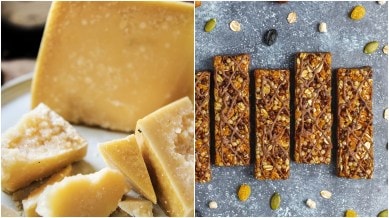📣 For more lifestyle news, click here to join our WhatsApp Channel and also follow us on Instagram
Nutritionist says Parmesan cheese has more protein, half calories than a protein bar: ’28 grams of this gives you…’
Hint: Think of Parmesan as a nutrient booster, not a protein supplement

Nutritionist Mohita Mascarenhas recently shared on Instagram that Parmesan cheese has more protein than a protein bar. According to her, 28 grams of Parmesan gives you 10 grams of complete protein in 110 calories. “It is lactose-free, has a good amount of calcium and phosphorus. You can eat it alone or pair it with a fruit and enjoy it as a snack,” said Mascarenhas.
However, she mentioned that one shouldn’t overdo it. “It is pretty high on sodium,” cautioned Mascarenhas.
Is there any truth to this claim?
Dt Amreen Sheikh, chief dietitian, KIMS Hospitals, Thane, concurred that it is “surprisingly true”. “Parmesan is one of the most protein-rich cheeses available. Just 30 grams (about 2 tablespoons) can give you around 10 grams of protein, while many protein bars contain 8 to 12 grams in the same portion size, often with added sugars or artificial ingredients. So, gram for gram, Parmesan can actually match or even exceed some protein bars in pure protein content,” said Sheikh.
What makes Parmesan such a rich source of protein?
According to Sheikh, Parmesan is a “hard, aged cheese, which means most of its moisture is removed during ageing, leaving behind concentrated nutrients”. “Along with protein, it also provides a good amount of calcium and phosphorus, both of which support bone and muscle health. Since it’s made from cow’s milk and aged for more than a year, the proteins become easier to digest, too,” explained Sheikh.
Does that mean Parmesan is a healthier choice than protein bars?
Not necessarily, remarked Sheikh. “While Parmesan offers natural protein, protein bars are often enhanced with vitamins, minerals, and sometimes fibre. The difference is in their purpose. Parmesan is a whole food, while a protein bar is a convenience food. For a quick snack or post-workout bite, a protein bar might be a better option. But if you want to add more natural protein to your meals, Parmesan is an excellent choice,” said Sheikh.
What should people keep in mind while adding Parmesan to their diet?
Portion control is important. Sheikh contended that Parmesan is high in sodium and fat, so a little goes a long way.
“Instead of piling it on pasta or pizza, try adding a tablespoon to soups, salads, or roasted vegetables. It enhances flavour and adds protein without significantly increasing calories,” said Sheikh.
So, the expert stressed that one should think of Parmesan as a “nutrient booster,” not a protein supplement. “Use it wisely, and it can be a tasty way to incorporate quality protein without the processed ingredients found in most bars,” said Sheikh.
DISCLAIMER: This article is based on information from the public domain and/or the experts we spoke to. Always consult your health practitioner before starting any routine.
📣 For more lifestyle news, click here to join our WhatsApp Channel and also follow us on Instagram